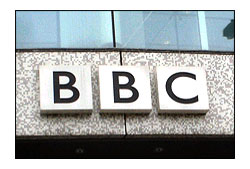 BBC Worldwide, its commercial arm, is planning to expand its international activities by starting six new channels in the India and US. There is scope for "five BBC branded channels in addition to news in any major market" offering a mix of content from the BBC and other British broadcasters, BBC Worldwide's Chief Executive John Smith said.
BBC Worldwide, its commercial arm, is planning to expand its international activities by starting six new channels in the India and US. There is scope for "five BBC branded channels in addition to news in any major market" offering a mix of content from the BBC and other British broadcasters, BBC Worldwide's Chief Executive John Smith said. It is already active in India, a country in which the World Service has been operating for 75 years. The corporation, in partnership with Mid Day Multimedia, won seven FM Radio licences in Delhi, Mumbai and Bangalore last year.
Smith said India was "looking interesting" but added there were three or four parts of the world they were focussing on.
Last year BBC made a trading profit of Pounds 89.4 millions by selling British television, magazines and news media to the world.
The new channels will be funded
RADIO TIMES and 50 other popular magazines make the BBC Britain’s third largest publisher of consumer titles. The broadcaster now wants to replicate that power as part of its push abroad.
John Smith, the chief executive of the BBC’s commercial arm, said that the corporation had £350 million in unused borrowing, which could help it “make small acquisitions” internationally as it tries to export its formats abroad.
At the same time, Mr Smith said, he was hoping to make “tens of millions” from the BBC’s soon to be established bbc.com, the international website. That will feature a “limited range of carefully placed advertising” aimed at ensuring that the international internet edition breaks even.
As with television, the BBC has begun to dip its toe in the water with magazine expansion. Top Gear is published in 30 countries, while Teletubbies appears in Poland and Good Food in Romania. But these are only licence agreements, in which the BBC receives a modest royalty payment.
However, Mr Smith said that there was “scope to expand through joint-ventures and acquisitions” and demonstrate that the BBC wants to step up its activity as it builds an international television presence — cross-promoting titles built up with cash from the licence fee payer.
In India the BBC formed a joint-venture with The Times of India to create a magazine publishing operation owning 33 titles. The ubiquitous Top Gear is now published on the sub-continent and more familiar BBC brands are expected to follow.
The BBC may also try to expand its range of magazines in Britain, although any new title has to be programmerelated. It is considering, under the name Project Phoenix, publishing a current affairs title to compete with The Economist or The Spectator which could be based on Panorama or Newsnight.
The BBC’s international internet presence is also designed to ensure that web surfers overseas are not able to use BBC content for free, when British licence fee payers have paid for it. The corporation is careful to ensure that some of its online output — such as live coverage of World Cup games — is available only to viewers in the UK because that would otherwise affect international rights agreements.
The corporation’s thinking even extends to charging to watch programmes online for overseas viewers, as it tries to make its internet player become “the video equivalent of iTunes”.
Last year, BBC magazines made £19.3 million, down slightly after a number of titles that were not tied into programmes were sold. The bulk of the income comes from Radio Times, which accounts for about a third of turnover. Digital media profits, meanwhile, were a modest £3.4 million. Times Online and The Hindu)